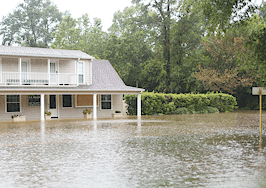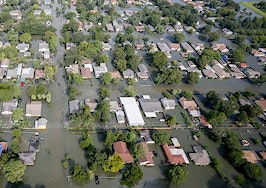The deadline to extend the National Flood Insurance Program (NFIP) expires Friday, meaning both the House and Senate have just days during the lame duck session to ensure homeowners suffering flood damage will have protection.
The program – which has been reauthorized seven times with no longterm solution in place – was last extended on July 31, hours before it was set to expire. A GOP aide told Inman that action is anticipated on re-authorizing NFIP by the end of the week.
“In this lame duck session, the National Association of Realtors, along with Realtors across the country, believe that Congress must prioritize reauthorization of the National Flood Insurance Program, which expires at the end of this month,” John Smaby, a Minnesota Realtor and the 2019 president of NAR, wrote in an op-ed for The Hill.
“Every passing deadline and failure to reauthorize and reform the program for good introduces needless uncertainty and flood risk for small businesses and homeowners in 22,000 communities across the country.”
The NFIP is a government program aimed at providing homeowners, business owners and renters with affordable flood insurance. It’s overseen by the Federal Emergency Management Agency (FEMA) and has been active since 1968.
The NFIP is able to provide affordable insurance by encouraging communities to adopt and enforce floodplain management regulations, according to FEMA. Those efforts are able the further mitigate effects of flooding. Overall, the program reduces the socio-economic impact of disasters by promoting the purchase and retention of insurance, FEMA says.
A study published in March found that FEMA significantly underestimates the number of properties at risk of flooding, impacting homeowners’ insurance in low and moderate flood zones. The study found that nearly 41 million Americans could be exposed to a major flood, more than double FEMA estimates.
A September 2018 report from the Congressional Research Service found that the program is currently $20 billion in debt – even after President Donald Trump outright canceled $16 billion of the program’s debt. Damages sustained during Hurricane Florence, Michael and others during the 2018 Atlantic Hurricane season could drive the program deeper into debt, although FEMA has not made recent numbers available.
The NFIP has operated in at least $16 billion of debt since Hurricane Katrina struck in 2015.
Those calling for the program’s extension, have also been vocal in its reform, namely the National Association of Realtors. NAR told Inman it would have a statement by the end of the week, but directed us to the op-ed published by Smaby.
NAR has been among the organizations to vocally support the 21st Century Flood Reform Act, introduced by Wisconsin Republican Congressman Sean Duffy, which would extend the program until 2022 and encourage private insurers to enter the marketplace. The legislation passed through Congress in 2017, but was never taken up in the Senate.
“With the challenges facing the program, reforms remain critical, as the NFIP provides up to hundreds of thousands of dollars of flood insurance coverage where required for a federally backed mortgage,” Smaby writes. “[The 21st Century Flood Reform Act] also provides an alternative to taxpayer-funded disaster assistance, which averages $5,500 per household but more often means an SBA loan that must be repaid with any underlying mortgage.”
Critics of the reform, like New York Congresswoman Nydia Velazquez, have said the bill will make flood insurance, “more expensive, less available, and less fair for millions of working families.”
Specifically, Velazquez takes issue with the “Write Your Own,” aspect of NFIP – which allows participating property and casualty insurance companies to write and service the policy in their own names and be reimbursed by FEMA – and believes the bill will only further embolden private insurers to make it difficult for policyholders to be made whole.
“This bill requires policyholders to ‘exhaust all administrative remedies’ on any disputed claim before having their day in court,” Velazques said in November 2017, while opposing the bill. “However, we have already seen that FEMA’s administrative system is broken – and this bill would enable dishonest insurance providers to continue hiding behind an unreachable threshold – meaning policyholders will never be made whole.”
Flooding is only expected to get worse, at the impact of climate change worsens, according to a recent Climate Assessment report published by 13 federal agencies and released Friday by the Trump Administration. The fourth National Climate Assessment estimates between $66 billion and $106 billion in real estate could sink below sea level by 2050, and between $238 billion and $507 billion by 2100.
A recent study from Zillow and Climate Central even allows homeowners to map the rising sea and view which homes will be at risk of chronic flooding, even if moderate emissions cuts are made.













